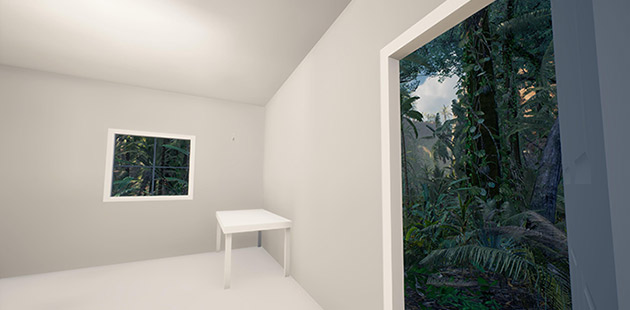 A team of researchers from the Black Dog Institute and UNSW has received an innovation grant to further investigate a mixed-reality experience which improves people’s mood and potentially reduces suicidal feelings. The grant from Suicide Prevention Australia (SPA) will allow the experience to be exhibited in Brisbane and tested as a suicide prevention tool in partnership with Metro South Health.
A team of researchers from the Black Dog Institute and UNSW has received an innovation grant to further investigate a mixed-reality experience which improves people’s mood and potentially reduces suicidal feelings. The grant from Suicide Prevention Australia (SPA) will allow the experience to be exhibited in Brisbane and tested as a suicide prevention tool in partnership with Metro South Health.
The installation project, The Edge of the Present, was developed for The Big Anxiety festival at UNSW in 2019. The project was led by Scientia Professor Jill Bennett from UNSW Art & Design and Professor Katherine Boydell from the Black Dog Institute, and developed in partnership with people with lived experience of depression and suicidality.
The ten-minute immersive sensory experience, designed by artist Dr Alex Davies from UNSW Art & Design, explores virtual landscapes within a purpose-built room. It gives the user the experience of being in a tropical rainforest one moment and a snow-covered mountain or desert landscape the next.
“This research is the first to assess the effectiveness of such an immersive mixed-reality experience as an intervention for depression and hopelessness,” said Professor Bennett, a UNSW ARC Laureate Fellow. “It does so by rapidly increasing positive mood and stimulating positive ‘future thinking’.”
The study aims to establish whether an immersive virtual-reality experience can not only impact an individual’s mood but also cultivate the capacity for future thinking and the sense of undertaking positive actions.
“The experience is not just a passive one – but involves the user making choices to open doors and windows. This is important as each choice is rewarded by positive sensation,” said Professor Bennett. So, for example, you open a door and feel the breeze on your face, or step out into the warmth of a sun-baked meadow.”
Professor Boydell led a pilot study conducted during The Big Anxiety festival in 2019. The research was funded by the Black Dog Institute’s NHMRC Centre of Research Excellence in Suicide Prevention and included 79 people, many with lived experience of depression and suicidality. It tested people’s mood immediately before and after the experience.
Professor Boydell said the data from the pilot study showed the platform has capacity to induce immediate mood change. “We demonstrated that positive mood and well-being increased significantly post-intervention. Hopelessness scores decreased, as well as negative mood. So now we hope to replicate the study on a larger scale in Brisbane at a location which doesn’t have the stigma of a health agency,” she says.
“Nothing has made me feel instantly better than this virtual-reality work,” one participant in the pilot study reported. This is the seventh time that I’ve been back and I just can’t get enough of it. Maybe it’s because I have an addictive personality, but I just feel like my mood is instantly better!”
The SPA grant will see the installation exhibited later this year as part of The Big Anxiety festival in Brisbane, in partnership with Metro South Health. The team sees longer-term potential for the platform to be adapted for suicide prevention in care settings such as clinics and psychiatric emergency, providing a positive and hopefully beneficial experience for those in crisis.
“This would be a world-first for psychiatric emergency, as these settings currently offer very little for patients to do. Acute patients are often accommodated in a room with nothing in it. So to offer patients such an environment would be a big shift, especially if the experience proves it can cultivate neural pathways for positive thinking,” said Professor Bennett.
Image: A room looking out onto a lush forest, one of the virtual landscapes in the mixed-reality experience, The Edge of the Present – photo by Alex Davies
